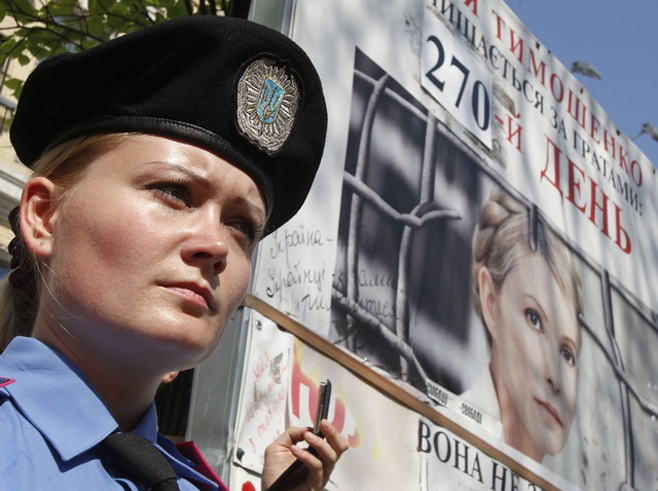
Kyiv Claims US Senate Resolution on Tymoshenko Not Serious
Publication: Eurasia Daily Monitor Volume: 9 Issue: 175
By:

A US Senate resolution calling for visa sanctions against Ukrainian officials for jailing former Prime Minister Yulia Tymoshenko last October has caused great controversy in Kyiv. Tymoshenko’s opposition party, Fatherland, welcomed the resolution, describing it as an important warning to President Viktor Yanukovych, whom they hold responsible for Tymoshenko’s imprisonment. The government, on the other hand, has dismissed it, saying the resolution was not binding and dropping hints that those who pushed it through in the U.S. Senate were on the Ukrainian opposition’s payroll. In any case, the resolution must have affected Yanukovych’s mood ahead of his visit to New York to attend the UN General Assembly session this week.
The U.S. Senate’s Foreign Relations Committee passed the draft of the resolution authored by James Inhofe (R-OK) and Dick Durbin (D-IL) on September 19. The resolution said that Tymoshenko was a pro-Western reformer whom the Ukrainian administration jailed in an effort to dispose of a political rival. The resolution suggested that the State Department introduce a visa ban on those responsible for her imprisonment and that the State Department and the Organization for Security and Cooperation in Europe (OSCE) apply pressure on Yanukovych to release Tymoshenko. The Ukrainian Foreign Ministry dismissed the draft, saying that it reflected only the views of its authors “known for sympathizing with the Ukrainian opposition” (Kommersant-Ukraine, Sepetmber 21).
The Ukrainian foreign ministry spokesman, Oleg Voloshyn, downplayed the resolution, saying that there was a low chance that the US government would follow the recommendations. Voloshyn also cited US Assistant Secretary of State Philip Gordon as saying at a conference last week that his administration would prefer dialogue to sanctions in relations with Ukraine (TVi, September 20). As a matter of fact, the ministry misinterpreted the US position; Secretary of State Hillary Clinton demanded Tymoshenko’s release early this year, so the resolution reflects the views of the Obama administration and not only the views of its authors (Interfax, January 20).
Kyiv hoped that the Senate would have had no time to approve the resolution before the elections in both the United States and Ukraine this fall, so its final approval on September 21 was an unpleasant surprise to the foreign ministry. The government presented it as a miracle worked in the US by Tymoshenko’s lobbyists. The foreign ministry in a statement released on September 22 dismissed the resolution as non-binding and said it was “difficult to seriously treat” the document which, the ministry claimed, was hastily edited in order to bypass other senators’ protests and approved late in the night in order to avoid discussions in the Senate. The ministry accused the unnamed “friends of Tymoshenko’s team” of trying to discredit Ukraine’s parliamentary elections scheduled for October 28 (Interfax-Ukraine, September 22).
The pro-government daily Segodnya, in an article published on September 24, described the resolution as a defeat of the Ukrainian government’s lobbyists by Tymoshenko’s lobbyists in the US Senate, saying that most of the senators were not even aware of the resolution passed in their name. Yanukovych’s office blamed the Ministry of Foreign Affairs for this defeat while the ministry blamed the Party of Region’s lobbyists in the US, according to the newspaper’s sources. The deputy chairman of the parliament’s foreign affairs committee, Leonid Kozhara, said that the resolution was a “sense of Senate”—not making law and not enforceable. He went as far as claiming that the resolution was pushed through by certain US firms, which were “paid very big money” to ensure its support among senators (ICTV, September 24).
Meanwhile, the opposition hurried to hype the significance of the resolution. Anatoly Hrytsenko, a candidate for parliament from the Fatherland party, welcomed it as “the last warning” from the United States to Yanukovych, although admitting that it was non-binding (Interfax-Ukraine, September 24). Tymoshenko’s lawyer Serhy Vlasenko, who is a people’s deputy, said that Fatherland would send its proposals to the US State Department on whom to include on a future visa ban list. He said President Yanukovych should top the list, to be followed by his older son—who, as a businessmen, is “the main financial sponsor of the totalitarian regime in Ukraine”—as well as the prosecutors who indicted Tymoshenko and Prime Minister Mykola Azarov (Ukrainska Pravda, September 24).
The opposition deliberately hypes the issue, which perfectly suits its purposes in the midst of an election campaign. At the same time, the government, judging by its tone, hardly underestimates the significance of the resolution, which is the first official document calling for sanctions against Kyiv approved at such a high level in Washington. There have been calls for sanctions also in the European Union, but Brussels made it clear that there would be no sanctions at least until after the elections in Ukraine. At the same time, Brussels has postponed the signing of an association and free trade agreement with Kyiv indefinitely over Tymoshenko’s imprisonment. European Commission President Jose Manuel Barroso, addressing participants in a high-level forum in Yalta on September 15 via a video link, said he saw no political conditions for the signing (Interfax-Ukraine, September 15).




